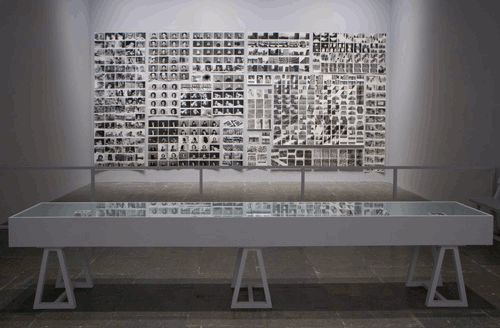| The installation made for the Whitney Biennial of 2010 is a re-contextualization of the photographic elements of my first photo installation in 1978 also titled “how to look…” in a context where the addition of new elements, a film loop and a series of texts, radically alter the meaning and the impact of the original work and foreground how historical distance transforms visual material.
What in 1978 was the vernacular of the photographer’s world, a series of black and white prints in the 8 by 10 inches standard size is now perceived as remains of a past where photography was linked to infinite variations of the same and was dominated by the frame. Now the wall of 450 black and white prints is seen in relation with a 12-minute film loop that shows the apparent destruction of the same wall of photographs that is in front of you. The irony of an implied destruction next to the same wall in all its massive presence is further complicated by self-reflexive texts that weave past and present and two set of small playing cards exhibited under glass on a narrow table that faced the wall. The images on the cards can be seen on the wall.
Furthermore the wall of prints is presented in a pristine new space painted light grey and lighted with a soft bluish glow, which emphasized the silvery white, grey and pure black and drained the photographs of all colors. The room dimensions were calculated to demonstrate how distance, and proximity modify categories and meanings in the task of sorting out and classify photographs. The wall, banister, table and the two benches are all painted the same light grey and the wall of photographs is facing an empty pure white wall.
Slide Show:

The installation is reflecting on photo spectatorship.
Wall of photographs assembled in 1977-1978,
Photo playing cards from 1978,
Texts and film loop from 2010. Space design & furniture executed in 2010.
Next to the two panels with the texts were shown images and
documents that were traces of the work in progress done in 1978
when the arrangement of prints on the wall was decided.
Comments
The prints made as playing cards that were shown under glass on the elongated table were changed every weeks and showed an increasingly level of disorder as the weeks progressed. The overall cycle of the changes was reset to the same starting point every four weeks going from a relatively orderly display to an increasing chaos, all of it under glass and untouchable!
The work was widely mentioned in most reviews of the Biennial
|